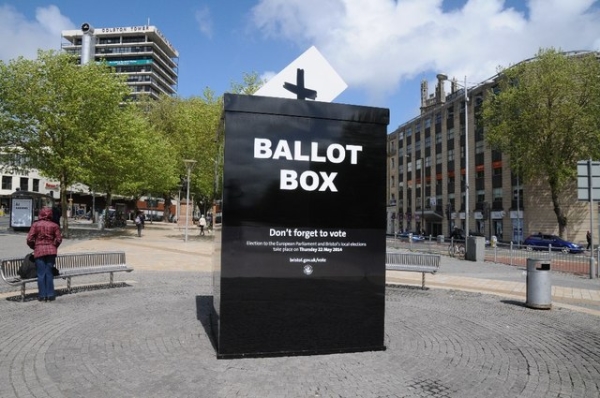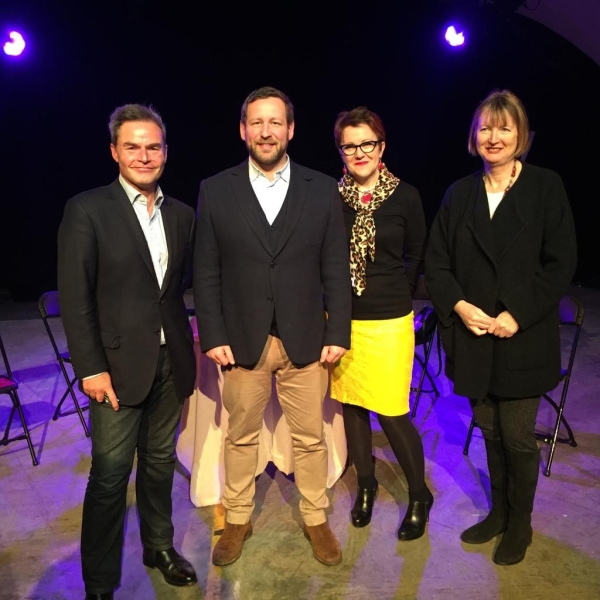Matt Trueman: Wondering how to vote? Pick your philistine carefully

Manifestos are still being written – as the politicians onstage were only too keen to stress – so yesterday's Vault Festival panel on arts policy contained neither promises nor pledges. However, with all the major parties talking arts and culture for the first time in this election campaign, it was a significant moment: a chance to glean the battle-lines.
I say all the major parties: there was no sign of the Lib Dems – shamefully given the big guns representing other parties. Labour had their deputy leader (and former Culture Secretary) Harriet Harman on duty. Ed Vaizey, Minister for Culture etc, was in for the Conservatives. UKIP and Green Party spokesfolk were present – albeit half an hour late in the case of the Greens' Martin Dobson, a Liverpudlian presumably confined to off-peak trains by party coffers. At least he made it. Of the Lib Dems, nada. Perhaps it's their election strategy: stay out of sight in the hope that everyone forgets not to vote for them.
I find myself in the unexpected position of agreeing with Ed Vaizey. He called for a more nuanced debate around arts policy, one that gets beyond the usual black-and-white thinking. As he put it: "If you give the arts more money, you're a hero. If you give it less, you're a philistine."
It's easy to see the political mileage in that, coming as it does from a man who has presided over a 33% reduction in Arts Council funding since 2010. But Labour has already ruled out reversing those cuts – worth £83 million in total – so there's little to be gained from such binary thinking. Insist otherwise and you can only vote Green: the one party promising a funding increase, funded by tax hikes and distributed through local authorities, regardless of the practicalities.

It's a populist policy, at some level, but it also seems a simplistic solution. That's its beauty, true, but UKIP's Peter Whittle made the emptiness of populist slogans all too clear, harrumphing back to the BBC of old, the intrinsic value of art and the importance of proper access without providing the slightest hint of how his party might begin to implement any of it.
Hamstrung by committing to Tory cuts, Labour have clearly identified education as the chink in Conservative cultural policy. Harman spoke, several times, of a "universal entitlement to creative education for every child" – a phrase that felt as close to official policy as any on the day. It would, she continued, be a necessary element of education, with cultural provision assessed by OFSTED. It's a good line of attack, especially after the damage done to arts education under the coalition.
Beyond that, Harman demanded that "every pound [of public subsidy] must not only create excellence but also face outwards" and increase access – something new shadow culture secretary Chris Bryant has already raised. This is shakier ground: great as rhetoric, but in practice, the two aren't so easily reconciled. Excellence comes in different shapes and sizes and it can easily look elitist and inaccessible – not that that's a straightforwardly bad thing. As was pointed out, we talk of elite sportsmen and women with pride.
However, I doubt Vaizey would disagree with much of that. Speaking personally and in no way pledging, promising or even predicting a thing, he outlined his intention to maintain subsidy and free museum entry, to encourage philanthropy and "to continue to redress the balance" between London and the rest of the country.
What Vaizey has going for him is the ability to admit complexities, attributing the London-regional divide, in part, to national organisations with London postcodes and arguing the need for a mixed funding system of subsidy, philanthropy and tax relief. He'll talk carefully about access and elitism, willing to go off-piste and away from party politics to talk about a subject he clearly holds dear. This was the job he requested of David Cameron and you suspect he'd be outstanding at it if only he weren't a Tory – and, moreover, a Tory surrounded by Tories even more intent on stripping back the state. Given that, all he can do is position himself as the arts' protector, fighting to limit cuts handed down from on high.
The truth, though, is that there's plenty not being said in all this. Vaizey can talk of wanting to maintain funding all he likes. The IFS is predicting £50 billion more cuts if the Tories win, which is bound to affect arts funding. Labour look set to make £5.4 billion of their own. Will the arts really escape unscathed? Pick your philistine, basically, just do so carefully. Or vote Green.










